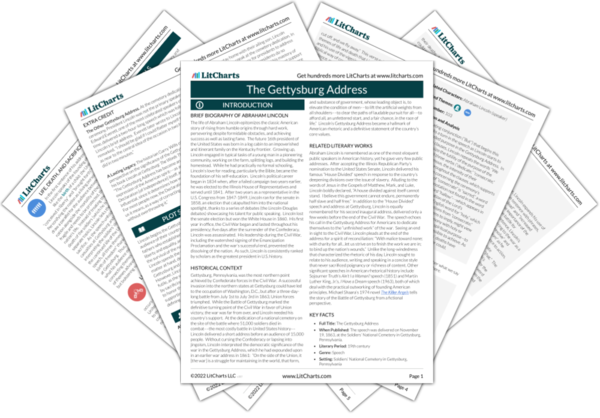Throughout his address at Gettysburg, Lincoln weaves together the past, present, and future in order to inspire his audience to action. In the first sentence, he calls the audience to remembrance by summoning the past, specifically the founding of the United States as a nation “conceived in liberty” and “dedicated to the proposition that all men are created equal.” This lays the foundation for Lincoln to contrast the past (the nation’s history) with the present (the current Civil War and the survival of the United States along with its founding principles). For the audience, remembering national values rooted in a shared past becomes the lens for understanding the present and what’s at stake in this war. Remembrance gives way to commemoration when Lincoln transitions to the immediate present, the task of dedicating the site where brave soldiers fought in the Battle of Gettysburg. However, Lincoln states that dedicating this ground––the ostensible purpose of his speech––isn’t necessary, since the soldiers’ deaths have hallowed the ground better than words ever could. Instead, Lincoln summons his audience to dedicate themselves to an ongoing cause––the cause of freedom for which the soldiers died. However, Lincoln avoids the grim, violent aspects of war by channeling the past in this present moment, interpreting the civil war as a struggle for democracy and beckoning the audience to ensure the nation’s future survival.
Remembrance, Commemoration, and Future Action ThemeTracker

Remembrance, Commemoration, and Future Action Quotes in The Gettysburg Address
Fourscore and seven years ago...

Unlock explanations and citation info for this and every other The Gettysburg Address quote.
Plus so much more...
Get LitCharts A+…our fathers brought forth, on this continent, a new nation, conceived in liberty, and dedicated to the proposition that all men are created equal.
But, in a larger sense, we cannot dedicate, we cannot consecrate—we cannot hallow—this ground.
The world will little note, nor long remember what we say here, but it can never forget what they did here.
It is rather for us to be here dedicated to the great task remaining before us—that from these honored dead we take increased devotion to that cause for which they here gave the last full measure of devotion—that we here highly resolve that these dead shall not have died in vain—that this nation, under God, shall have a new birth of freedom, and that government of the people, by the people, for the people, shall not perish from the earth.











